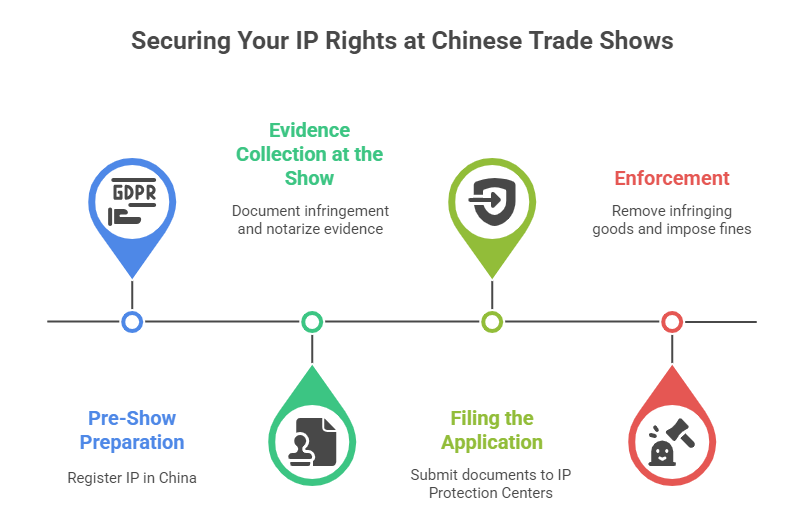For foreign exhibitors at China’s premier trade shows like the Canton Fair (China Import and Export Fair) and the China International Import Expo (CIIE), protecting intellectual property (IP) is a critical yet often overlooked challenge. Counterfeiters and copycats frequently target innovative products displayed at these events. Fortunately, China’s legal framework offers a powerful tool: temporary injunctions. Understanding how to secure these injunctions can mean the difference between safeguarding your IP and facing devastating infringement.

Why Temporary Injunctions Matter
China’s major exhibitions operate under strict IP protection protocols. The State Council’s 2025 Provisions on Handling Foreign-Related IP Disputes (Article 7) emphasizes expedited mechanisms for exhibition-related IP violations. Temporary injunctions—issued within hours—allow rights holders to:
- Immediately halt sales/distribution of infringing goods.
- Preserve evidence before counterfeiters remove products.
- Avoid costly delays that could derail market entry.
Step-by-Step: Applying for an Injunction
1. Pre-Show Preparation
- Register IP in China: Patents, trademarks, and designs must be registered with the China National Intellectual Property Administration (CNIPA). Unregistered rights (e.g., copyrights) require strong proof of ownership.
- Monitor Exhibition Listings: Review exhibitor directories in advance to identify potential infringers.
2. Evidence Collection at the Show
- Document Infringement: Take photos/videos of the booth, products, and promotional materials. Obtain brochures or samples.
- Notarize Evidence: Engage a local notary to certify evidence (critical for admissibility). For rapid support, consider a pre-verified IP investigation service.
3. Filing the Application
Submit to on-site IP Protection Centers at Canton Fair/CIIE or local courts. Required documents:
- IP ownership certificates (Chinese registrations).
- Notarized infringement evidence.
- A bond (typically 10–20% of the goods’ estimated value) to cover wrongful injunction costs.
4. Enforcement
If approved, local authorities will:
- Remove infringing goods from the booth.
- Prohibit further sales.
- Impose fines on violators (up to 5x illegal revenue under the Patent Law, Article 71).
Case Study: At the 2023 Canton Fair, a German robotics firm secured an injunction within 4 hours against a copycat exhibitor, preventing $500K+ in potential losses.
Pitfalls to Avoid
- Delayed Filings: Injunctions expire post-exhibition. File immediately after evidence collection.
- Insufficient Evidence: Unnotarized photos or vague claims lead to rejection.
- Unregistered IP: Foreign patents/trademarks offer no protection without CNIPA registration.
Strategic Tips for Exhibitors
- Pre-Show IP Audits: Verify registrations and monitor Chinese trademark databases.
- On-Site Legal Support: Partner with local IP attorneys for rapid response.
- Post-Show Follow-Up: Use injunction evidence in permanent infringement lawsuits.
The Bigger Picture
Temporary injunctions are part of China’s broader push to strengthen IP enforcement. The 2024 Revised Patent Law Implementation Rules (Article 69) expands exhibitors’ rights to seek preliminary injunctions through administrative or judicial channels. For foreign businesses, this signals a more level playing field—if you act decisively.
Final Thoughts
Navigating China’s IP landscape requires proactive preparation and local expertise. By mastering the injunction process, you transform exhibitions from vulnerability points into secure platforms for growth. As China’s markets grow more accessible, protecting your innovations isn’t just legal diligence—it’s competitive advantage.
